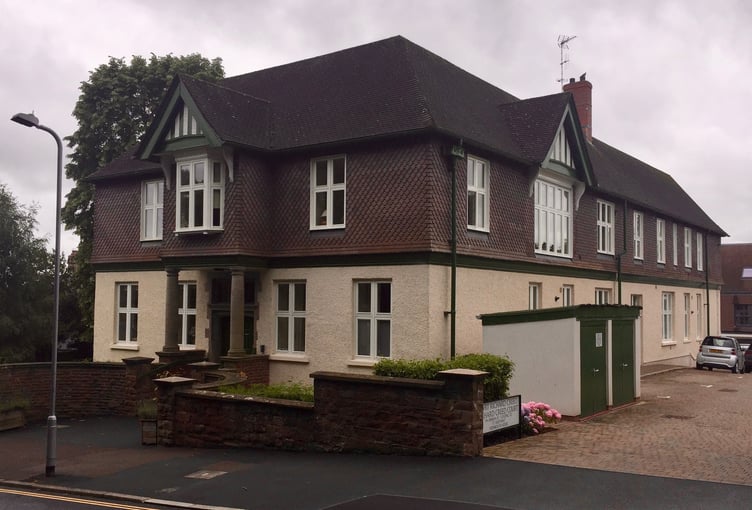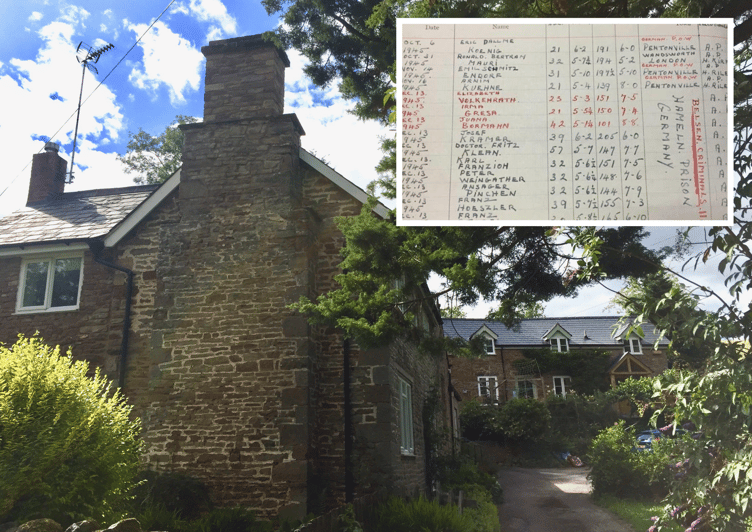THE rain beat down so hard, it seemed the day of judgement was just a thunder peal away. And for the desperate killer crouched in the bushes beside the River Monnow, it was. Cornered by armed police and soldiers 80 years ago this week, Ronald 'Scarface' Mauri knew he had reached the end of the road just yards from Monmouth town centre.
Lifting up his revolver, he took aim across the stream, determined to take one of his pursuers with him but a shot rang out from Vauxhall Fields, hitting him on the side of the head and plunging him unconscious into the water.
Pulled out, the 32-year-old was rushed to the nearby Monmouth Cottage Hospital beside the town's girls' school. If he hoped his injuries were fatal, saving him from an appointment with the hangman, he was sorely mistaken, as his head was bandaged up and Scotland Yard's top murder cops summonsed to take him away.

Few townspeople will know of the drama on their doorstep in July 1945, when a nationwide manhunt reached its climax with a 110-mile road chase and a Sunday tea-time gun fight in torrential rain in sight of King Henry V's Monmouth Castle birthplace.
Mauri, nicknamed 'Scarface' after being slashed across the face by fellow prisoners at Dartmoor Prison four years earlier, was wanted for strangling and battering to death his 18-year-old girlfriend Vera Guest at his sister's house in Hillingdon, west London, four days earlier.
Vera’s worried neighbours called police on Wednesday, July 11, after hearing screams coming from the house and a man leaving in a hurry. Officers found the doors locked but forced entry and inside discovered the shocking sight of Vera's lifeless body on the bed, with a head wound and a scarf tied tightly round her neck.
Missing Mauri was the prime suspect, and boasted in letters sent to police and his employers the next day that he would 'kill six more’, including his estranged wife, before killing himself. He accused police of framing him for the theft of a consignment of cigarettes from his delivery lorry the previous month, and said he would gun down any officer who came his way.
Detectives were desperate to detain him before he could carry out his deadly threat, and on Sunday, July 15, they got their break when a car was stolen and a gun fired at pursuing police in Chichester. The thief was identified as Mauri, and the chase was on.
Tracked westward through sightings across the country, he outgunned chasing patrol cars before being spotted in the hamlet of Sollers Hope near Ross-on-Wye where he asked farm worker Fred Gittoes for petrol from a pump at Falcon Cottages. Unbeknown to Mauri, Gittoes was a special constable and thought the driver looked like the wanted man.

Noting down the car number he went inside to phone Ross-on-Wye Police Station to be told the man was indeed Mauri… and he was armed! Realising he had been recognised, Mauri raced off at speed again towards Newent and the Forest of Dean, where officers rushed to mount patrols to try and catch the killer on their patch.
The next sighting was an hour later in the Forest, where Mauri held up a couple at gun point and stole the woman's handbag before racing off westwards towards Monmouth. Armed officers were in hot pursuit as Mauri was spotted in the Wyeside town trying to steal petrol, before speeding away up the town’s Hereford Road in a vain bid to reach and hide out in the Black Mountains.
But as the torrential rain poured and the thunder rolled he ran out of petrol in the Buckholt shortly before 5pm, and fled into the woods on foot with a revolver in his hand.The 'posse' - boosted by soldiers from Vauxhall Camp - were right behind and "bloodhounds" were quickly on his trail as his pursuers beat the woods to flush him out.
Mauri ran across Manson Lane, over fields and headed back towards town, shooting at his chasers and reportedly injuring one before reaching the banks of the Monnow. Crouched in riverside bushes at the back of a house on the Parade, and surrounded by police on both sides of the river, he raised his gun and shots rang out.
But Monmouth Police Station chief, Inspector Reginald Bishop, proved quicker on the draw, grazing the side of Mauri’s head with a shot that made him fall into the water. A youngster who witnessed the drama after hearing shots told a reporter: “I saw the police inspector fire because the man was holding a revolver and shouted something.“When he was shot he fell into the river I thought he was dead. But they pulled him out and I could see he was injured in the head.”
Mauri was rushed by police car 200 yards to the cottage hospital - now converted into flats - where he was patched up and kept under armed guard for two days, while Reg Bishop and his team basked in the praise coming down the phone line from Scotland Yard.
Newspapers reported the killer “chatting and smoking cigarettes” with his three Monmouth Police guards while waiting the arrival of the “Murder Squad”.
Tried at the Old Bailey two months later, Mauri claimed that Vera had asked him to kill her in a suicide pact because she couldn't live without him if he went back to prison for the theft of the cigarettes. But there was no way of escaping his fate as Justice Tucker donned the black cap, and Mauri was escorted to the death cell at Wandsworth Prison to await his appointment with chief executioner Albert Pierrepoint on October 31, 1945.
His execution came just weeks before Pierrepoint travelled to Hamelin in Germany for the execution of former Nazis convicted of war crimes at Belsen concentration camp. In his 25 year career he hanged many murderers—including John Haigh (the Acid Bath Murderer) and John Christie (the Rillington Place Strangler), Timothy Evans, Derek Bentley, William Joyce known as Lord Haw Haw who was executioned for high treason and Ruth Ellis the last woman to be hanged for murder in the UK.




.jpeg?width=209&height=140&crop=209:145,smart&quality=75)
Comments
This article has no comments yet. Be the first to leave a comment.